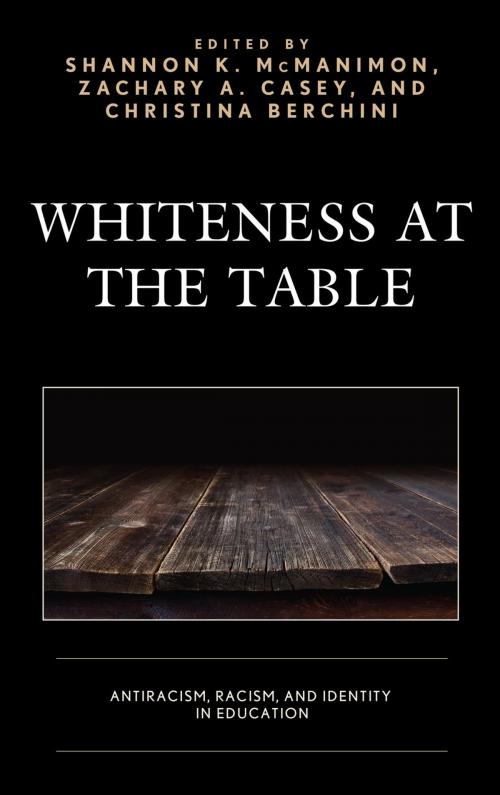Whiteness at the Table
Antiracism, Racism, and Identity in Education
Nonfiction, Reference & Language, Education & Teaching, Educational Theory, Multicultural Education| Author: | Christina Berchini, Zachary A. Casey, Beverly E. Cross, Bryan Davis, Decoteau J. Irby, Mary E. Lee-Nichols, Audrey Lensmire, Timothy J. Lensmire, Shannon K. McManimon, Erin T. Miller, Samuel Jaye Tanner, Jessica Dockter Tierney | ISBN: | 9781498578080 |
| Publisher: | Lexington Books | Publication: | October 15, 2018 |
| Imprint: | Lexington Books | Language: | English |
| Author: | Christina Berchini, Zachary A. Casey, Beverly E. Cross, Bryan Davis, Decoteau J. Irby, Mary E. Lee-Nichols, Audrey Lensmire, Timothy J. Lensmire, Shannon K. McManimon, Erin T. Miller, Samuel Jaye Tanner, Jessica Dockter Tierney |
| ISBN: | 9781498578080 |
| Publisher: | Lexington Books |
| Publication: | October 15, 2018 |
| Imprint: | Lexington Books |
| Language: | English |
Antiracist work in education has proceeded as if the only social relation at issue is the one between white people and people of color. But what if our antiracist efforts are being undermined by unexamined difficulties and struggles among white people?
Whiteness at the Table examines whiteness in the lived experiences of young children, family members, students, teachers, and school administrators. It focuses on racism and antiracism within the context of relationships. Its authors argue that we cannot read or understand whiteness as a phenomenon without attending to the everyday complexities and conflicts of white people’s lives.
This edited volume is entitled Whiteness at the Table, then, for at least three reasons. First, the title evokes the origins of this book in the ongoing storytelling and theorizing of the Midwest Critical Whiteness Collective—a small collective of antiracist educators, scholars, and activists who have been gathering at its founders’ dining room table for almost a decade.
Second, the book’s authors are theorizing whiteness not just in terms of structural aspects of white power, but in terms of how whiteness is reproduced and challenged in the day-to-day interactions and relationships of white people. In this sense, whiteness is always already at the table, and this book seeks to illuminate how and why this is so.
Finally, one of the primary aims of Whiteness at the Table is to persuade white people of their moral and political responsibility to bring whiteness—as an explicit topic, as perhaps the most important problem to be solved at this historical moment—to the table. This responsibility to theorize and combat whiteness cannot and should not fall only to people of color.
Antiracist work in education has proceeded as if the only social relation at issue is the one between white people and people of color. But what if our antiracist efforts are being undermined by unexamined difficulties and struggles among white people?
Whiteness at the Table examines whiteness in the lived experiences of young children, family members, students, teachers, and school administrators. It focuses on racism and antiracism within the context of relationships. Its authors argue that we cannot read or understand whiteness as a phenomenon without attending to the everyday complexities and conflicts of white people’s lives.
This edited volume is entitled Whiteness at the Table, then, for at least three reasons. First, the title evokes the origins of this book in the ongoing storytelling and theorizing of the Midwest Critical Whiteness Collective—a small collective of antiracist educators, scholars, and activists who have been gathering at its founders’ dining room table for almost a decade.
Second, the book’s authors are theorizing whiteness not just in terms of structural aspects of white power, but in terms of how whiteness is reproduced and challenged in the day-to-day interactions and relationships of white people. In this sense, whiteness is always already at the table, and this book seeks to illuminate how and why this is so.
Finally, one of the primary aims of Whiteness at the Table is to persuade white people of their moral and political responsibility to bring whiteness—as an explicit topic, as perhaps the most important problem to be solved at this historical moment—to the table. This responsibility to theorize and combat whiteness cannot and should not fall only to people of color.















